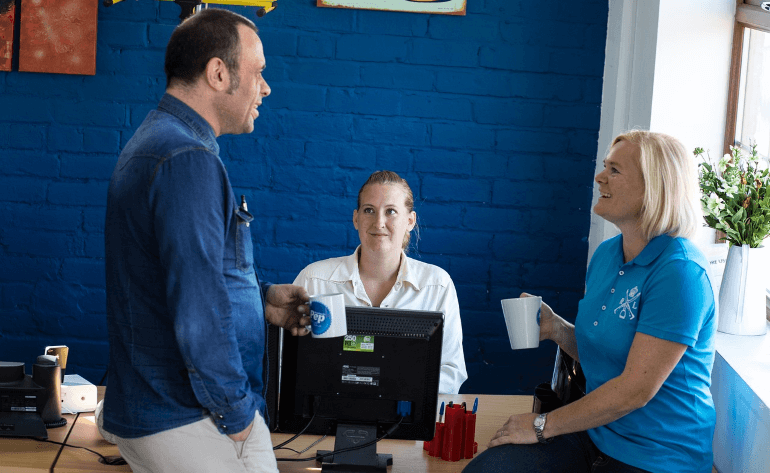One of the unavoidable charms of having an international workforce spread across multiple countries is that the various cultures of your staff are inevitably going to mix. While we work in English, we’re headquartered in Hungary with employees hailing from Portugal, Belgium, Romania and more. And when you put such a diverse team together, they all start to find interest in the individual differences in culture and language.
Useful Words and Sentences
While there’s no expectation for anyone at clovio to learn the native language of their colleagues, it’s always fun to unexpectedly wish them ‘good morning’ in their mother tongue or to ask a question in the way they are familiar with…
| English | Hungarian | Portuguese | Spanish | Romanian | Flemish |
| How’s it going? | Mi újság? (Mizu?) | Tudo bem? | ¿Cómo están? | Cum îți merge? (Toate bune?) | Alles kits? |
| Cheers! | Egészségedre! | Saúde! | ¡Salud! | Noroc! | Gezondheid! |
| Good morning! | Jó reggelt! | Bom dia! | ¡Buenos días! | Bună dimineața! | Goeiemorgen! |
| Coffee please. | Egy kávét kérek. | Café, por favor. | Café, por favor. | Cafea te rog. | Koffie alstublieft. |
| One sec… let me just check. | Egy pillanat, hadd csekkoljam le. | Um segundo… deixe-me verificar. | Permíteme un segundo. Voy a chequear. | O secunda… să verific. | Een momentje… ik zal even kijken. |
| Thanks! That’s great. | Király, köszi! | Obrigado! Isso é ótimo. | ¡Muchas gracias! Eso fue genial. | Mulțumesc! Foarte bine. | Bedankt! Dat is perfect. |
| Skype is letting me down. | A Skype már megint szívat. | O Skype está a dar-me problemas. | Skype me está dando problemas. | Skype îmi face probleme. | Skype laat me in de steek. |
| Awesome! | Tök jó! (Zsír!/Király!/Fasza!) | Ótimo! | ¡Genial! | Excelent! | Heel goed! |
| No problem! | Nincs mit! | Não há problema! | ¡No hay problema! | Nici o problemă! | Geen probleem! |
| Really appreciate your help. | Leköteleznél, ha segítenél. | Obrigado pela ajuda. | Realmente agradezco tu ayuda. | Apreciez mult ajutorul tău. | Jouw hulp is gewaardeerd. |
| Be my guest! | Csak nyugodtan! | Esteja à vontade! | ¡Va por mi cuenta! | Te rog! | Ga jouw gang! |
| Have a good night! | Jóéjt! | Boa noite! | ¡Que tengas buenas noches! | Noapte bună! | Goeienavond! |
Phrases and Sayings in Different clovio Languages
Every country – even regions within a country – have their own idiosyncratic ways of speaking, certain phrases and otherwise nonsense sayings that have over the years become popularized. While such specific dialectic differences would be impossible to share across clovio’s mix of linguistic differences, here are some of our favorites…
English (UK)
It’s raining cats and dogs
Naturally the English have countless ways of describing the rain, but if it’s raining especially heavily then this 17th Century phrase is guaranteed to be spouted by a Brit at some point.
A snowball’s chance in hell
If the odds aren’t favorable to whatever task you’re about to undertake, then it’s as likely to succeed as a snowball is likely to survive the burning heat of hell.
Don’t give up your day job
Perhaps the perfect example of British sarcasm, this one. If you’re not very good at something, then it’s likely someone will suggest it’s better to keep onto the job you already have if you want to make money.

As right as rain
If someone is feeling healthy or is just an all-round nice person, then they’re ‘right as rain’. It’s not quite certain where it comes from but only the Brits could use rain as a positive adjective.
Wind ya neck in
Specific to the northern part of England, telling this to someone is the same as asking them to calm down or to stop getting wound up about something minor.
Hungarian
Nem mind arany, ami fénylik
Meaning: Not all that glitters is gold
This popular expression is used in exactly the same way as its original Shakespearean counterpart, warning that not everything is as good or valuable as it first seems – which, coincidentally, is the very thing we suggest to our readers over at Best Reviews!
A hazug embert előbb utolérik, mint a sánta kutyát
Meaning: It’s easier to catch a liar than a limping dog
Lying only ever leads to being busted and ruining the reputation of the liar even further. This is exactly what this proverb passes on to people – and what a treasure it is in the age of fake news!
Sok lúd disznót győz
Meaning: Many geese could beat a pig
It seems Hungarian sayings have a lot to do with animals, right? But while this proverb makes no sense at first, it’s actually one of the boldest, meaning that no matter how strong you are, if your opponent is superior – or outnumbers you – then you’re pretty much done for.
A vér nem válik vízzé
Meaning: Blood never turns into water
This proverb is essentially saying that no matter how hard you try, you can’t deny who you really are. However, that’s not necessarily a bad thing; why do you think it’s such fun working at clovio?

Portuguese
É uma grande confusão
Meaning: It’s a big mess
This is not a proverb or anything, but this common Portuguese expression is used and adapted quite often to describe any sort of messy situation, when someone is confused about something, or when someone has a mental illness.
Ferver em pouca água
Meaning: Boiling in shallow water
A truly typical Portuguese expression that borrows from one of the country’s biggest pastimes – gastronomy – to describe someone’s temper. This refers to boiling water to cook food, with someone ‘boiling in shallow water’ being short-tempered.
Ninguém nasce ensinado
Meaning: You learn as you go
This is used as justification for asking a question that may seem silly or straightforward to another person. When starting a new job without any idea of the tasks, for instance, you may be too embarrassed to ask about how to perform a certain task. Moral of the story: don’t be shy, ask about whatever it is you don’t know. Or are you just supposed to guess?
Não ter papas na língua
Meaning: Being an honest and true person
Coming from our neighbors in Spain, this translates to “having no gruel in your tongue”. “Papas” are particles that develop in chicken tongues as a tumor, eventually preventing them from clucking. This expression is therefore used to describe the sort of honest people that say exactly what they think about something, even if that means going against the opinions of others.
Romanian
Nu lăsa pe mâine ce poți face azi
Meaning: Don’t postpone things until tomorrow
While this might be quite a self-explanatory saying, it’s widely used in Romania and underlines the importance of doing things immediately. It’s always a worthwhile reminder, though.
No gata? No hai!
Meaning: Let’s go!
Literally meaning “Are you ready? Let’s go!”, it is a Transylvanian Romanian idiom used by Avram Iancu, a famous Romanian army leader back in 1848 during the Hungarian Revolution. The leader used this renowned war call for his officers, but nowadays is used to highlight the importance and urgency of a situation.
Pauzele lungi și dese – cheia marilor succese
Meaning: Long, repetitive breaks are the key to one’s success
This famous saying became popular during the communist regime when everyone was working for the state and didn’t care about results. Nowadays it is used ironically to indicate a person’s lack of work ethic and discipline.

Spanish
¡Está guapísimo!
Meaning: He’s pretty handsome
It serves to highlight the benefits or characteristics of something or someone. However, its use is mainly intended to highlight the work of someone, also working as a kind of congratulation.
Cuentas claras conservan amistades
Meaning: Clear accounts maintain friendships
Meaning that so long as there are no debts between friends, personal relationships will last. Its use extends beyond the scope of monetary debts, however, and can be used in situations in which a person has lent something to another and the latter has not yet given it back.
Llegó Pacheco
Meaning: Pacheco arrived
This slang phrase means that the cold season has arrived, but it may also be used in relation to the feeling of low temperatures at any other time of the year.
La procesión va por dentro
Meaning: The procession goes inside
By referring to the sense of serenity displayed by someone who is suffering from or has just suffered a traumatic situation, the exterior look of calm that contrasts with the internal conflict that is living within the person.
Leer entre líneas
Meaning: Read between lines
As is the case with the same English phrase, this is used to highlight the value of understanding the subtext of meaning rather than the literal text. It is a widely used expression in the media, especially when dealing with issues that involve countries in conflict.

(West) Flemish
Bluvn goan
Meaning: Keep on going
When cheering on their favorite soccer team, while on their way to grab a couple of Belgian beers, or when soldiering on through the last leg of a productive working day, the West Flemish use this little motivational phrase to keep a strong pace.
Deur de meur en were
Meaning: Through the wall and back
Used when we want to do something thoroughly with nothing or nobody having the chance to obstruct us from success.
Tes ol gin oar snien
Meaning: It’s not like cutting hair
When a situation is tough this is the expression that the Flemish like to use to indicate that they’re in a pickle, while still knowing they won’t give in and will do whatever it takes to succeed.
Ka beter in min broek geskeetn
Meaning: I would have been better off shitting my pants
Oops… When things go awry we’d even sacrifice our fresh underwear, so long as the end result of our work on our media outlets is superb!
Leave a Reply